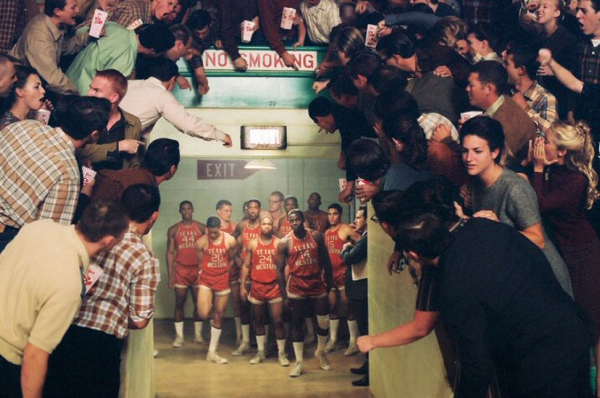Movie review by Greg Carlson
Yet another entry in Disney’s lineup of sports movies based on real events, “Glory Road” joins “Remember the Titans,” “The Rookie,” and “Miracle” as a mostly enjoyable – if not altogether penetrating – exercise in history at the movies. In other words, beyond the central fact that the 1965-66 Texas Western Miners won the NCAA Basketball Championship, “Glory Road” gets the Jerry Bruckheimer makeover, which means that the movie takes generous liberties with the record in order to arrive at the most entertaining, and hopefully profitable, version of events. “Glory Road” is not exactly “Hoosiers,” but the charismatic casting choices form a likable ensemble.
Josh Lucas, a tremendously talented actor still in search of a truly star-making part, makes a strong impression as coach Don Haskins, the driven taskmaster who contributed to NCAA history by starting five black players in the championship game versus Kentucky on March 19, 1966 – a tournament first. Despite the film’s familiar touchstones (learning that hard work on fundamentals pays off, putting the team first, etc.), Lucas finds a few moments in which the square-jawed earnestness that defines his character resonates with sincerity. It’s no mean feat to deliver motivational locker-room speeches without the been-there and done-that feeling, and Lucas sells it like a pro.
Following a leisurely section in which Haskins recruits his players from spots around the United States, the movie alternates between scenes of basketball and the development of the theme that racial integration on the basketball court can teach audiences about an underreported aspect of civil rights. “Glory Road” deserves some credit for placing the struggles of Haskins’ players front and center. Surly crowds shower the team with refuse, hotel rooms are violated and racial epithets are scrawled on the walls, and in one harrowing incident, a player is assaulted by a group of racists in a restaurant bathroom (it has been reported that dramatic license has been taken with much of the above).
By the time the movie has reached its final act, it is clear that writers Christopher Cleveland and Bettina Gilois have prioritized the off-court challenges faced by the Miners, but the rendering is usually far too superficial to inspire deep reflection. Presumably for the sake of excitement, a few facts (in addition to the ones listed above) are fudged. Among them: Haskins coached the Miners to the famous championship in his fifth season with the team, not during his first, as the movie has it. Additionally, the film suggests that the championship game was the first time Haskins went with five black players as the starting lineup, but he had done this in games prior to the showdown with Kentucky.
Despite the truth-stretching, “Glory Road” might raise awareness of a transitional time in college athletics. Audience members should stay for the end credits, in which a number of the actual subjects, including Haskins, Pat Riley (who played on the Kentucky team as one of “Rupp’s Runts”), and several of the Texas Western players, share their recollections of the noteworthy contest. Combined with game footage, the comments from the real-life participants prove to be more compelling than much of what was fictionalized.
